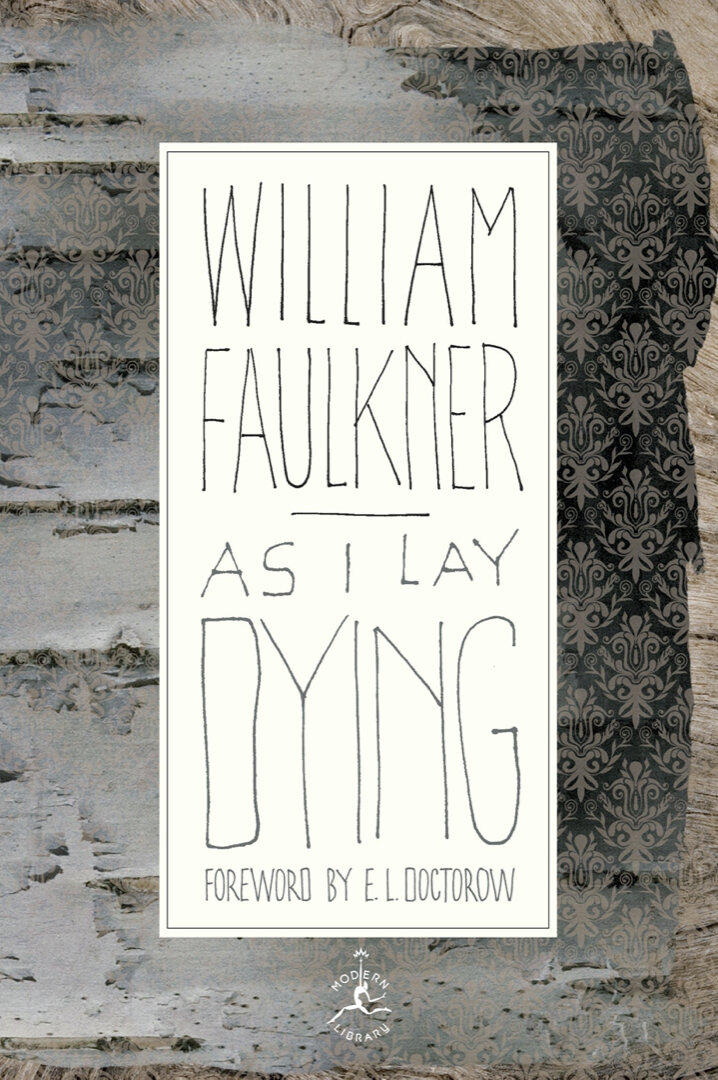By William Faulkner
Warning! Those gathered round your deathbed may not be as altruistic as you imagine.
William Faulkner doesn't invite us into the lives of the Bundren's; he drops us into their dysfunction. Addie Bundren is dying. We are here to witness her family satisfy her wish to be buried in Jefferson, some forty miles away. But this is 1930s Mississippi, rural and raw. The Bundren's are dirt poor and as we will see, there's more than Addie on their minds.
William Faulker was a self-educated Nobel Prize laureate from Oxford, Mississippi. In his excellent foreword, E.L Doctorow writes,
"Faulkner's life was messier [than Hemingway's], less focused, a struggle from the beginning to make enough money to survive: he was a school dropout and worked at various jobs--postmaster, bookstore clerk--and he held down the midnight shift in a coal-fired power plant, where, as it happened, he wrote most of As I Lay Dying in some six to eight weeks." pp. xii, xvii
Prominent Characters:
Addie Bundren: Addie is the dying matriarch, the subject of the fuss and folly, to satisfy her wish to be buried in the town of Jefferson, forty miles away. We discover her "true colors" late in the story through Faulkner's use of flashback. About her children in their youth she said, "I would go down the hill to the spring where I could be quiet and hate them." p. 150.
Anse Bundren: Addie's husband, but not the father of all her children. He doesn't know this, or perhaps, so caught up in his own misery, doesn't care. Doctorow describes him so well as "a spiritless man in faded overalls, physically weak but domineering in his passivity." p. xiii
Cash: is Addie's firstborn and of the engineer's mind. He fashions Addie's coffin, measuring his life, words, and moments with the same exacting tedium by which he bevels the edges of her coffin. When a neighbor asks Cash about the fall that broke his leg a long time ago, "How far'd you fall, Cash?" "Twenty-eight foot, four and a half inches, about" Cash says. Exacting and yet shallow.
Darl: Darl is a foil to this backwards Southern family. He showcases Faulkner's brilliance for dialogue, switching from the common and coarse vernacular of this Mississippi family to one whose descriptive powers and philosophical moments come forth as from some hidden power:
It begins to rain. The first harsh, sparse, swift drops rush through the leaves and across the ground in a long sigh, as though of relief from intolerable suspense. They are as big as buckshot, warm as though fired from a gun; they sweep across the lantern in a vicious hissing. Pa lifts his face, slack-mouthed, the wet black rim of snuff plastered close along the base of his gums; from behind his slack-faced astonishment he muses as though from beyond time, upon the ultimate outrage. p. 66
This description is polar opposite from those of the rest of the family; his musings as contemplative as those of Cash are wooden. He is so different, the family takes him for mental, though that appellation belongs to Vardaman.
Vardaman: The youngest of the children, it is obvious he is not playing with a full deck. Throughout the story Vardaman draws a correlation between a fish he caught and gutted to his mother lying in the casket. She is a fish.
Jewel: Harsh, profane, strong, determined . . . Jewel is the son of Addie, but not by Anse. He is a stone wall emotionally, furious in his anger, and powerful in strength. As Dewey Dell says of him, "And Jewel dont care about anything he is not kin to us in caring, not care-kin." p. 23
Dewy Dell: Dewey Dell is the only daughter, secretly pregnant and trying to "take care of it" before others realize it.
I can see why As I Lay Dying has captured and endured. Faulker gives us an all-white novel set in the rural South of his origins. The work is comical, sad, and insightful. Describing a time when Jewel regularly secreted himself away, Darl recounts:
One morning--it was November then, five months since it started--Jewel was in bed and he didn't join us in the field. That was the first time ma learned anything about what had been going on. She sent Vardaman down to find where Jewel was, and after a while she came down too. It was as though, so long as the deceit ran along quiet and monotonous, all of us let ourselves be deceived, abetting it unawares or maybe through cowardice, since all people are cowards and naturally prefer any kind of treachery because it has a bland outside. p. 115
I'm neither a literary scholar or a Faulkner scholar, but appreciate this comment Doctorow on the author: "As I Lay Dying does not look up to its characters, or down on them, but maintains them at eye level, where presumably a scrupulous dispassion gives Faulkner access to the unmediated truth." p. xviii
As noted earlier, Faulkner does not invite us in, he drops us in. We are present and unseen and it is that presence that gives us a picture of this haphazard and broken family, and in giving us this look, he helps us see ourselves as well.

